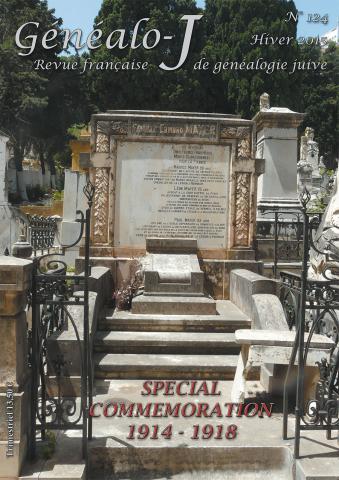
ABSTRACTS of Issue 124
Pierre Lautmann
The « LEVY » in the Very Last One
Through a survey as complete as possible about the “poilus” named LEVY who died during World War I, the author tries to find out what the archives are telling about their sacrifice. The horror of the fights is implicitly reappearing.
Huguette Pinto-Alphandary
From WW I to WW II. My father, Elie Pinto, Sapper from 8th Engineer regiment, a soldier of Verdun
This article relates the military career of Elie Pinto, the author's father, during First World War, using mainly his military record, his military file and his personal notes. Telegraph operator sapper in the 8th Engineer Regiment, he won several decorations and mentions. As a Veteran, he was allowed, as well as his wife, to keep the French Nationality during World War II although he was a Jew.
Norbert Bel Ange
French Jewish soldiers from Tlemcen (1914-1918)
As the author has been studying for many years the history of Algerian Jews, he has been more concerned here by the Jews from Tlemcen “died for France”.
Pierre-Gilles Flacsu
Moïse Flacsu, a Romanian Jew « died for France » and his Alsatian in-laws
Moïse Flacsu disappeared on September 25th, 1915.His remains will be found in 1935 only. He was born in Bucharest in 1878 and became a French citizen in 1907; he married in 1910 Georgette Heimendinger who was born in 1881 in Grussenheim, German Alsace. In 1914, her two brothers who had immigrated to Paris in 1901 are conscripted into the French army. On October 29th and 30th, Henri Heimendinger is killed and Alfred Heimendinger made prisoner. During that war, Georgette, 34 years old, became a widow; in addition she lost her elder brother and two cousins, killed as they were fighting in the German army.
Philippe Landau
Maghreb Jews in World War I
French citizens since 1870, about 11,000 Algerian “Israélites” participated during four years in the Great World War. They won distinctions on the battlefields of Artois and Dardanelles. This experiment will seal their genuine integration to France.
Marc Lazar
Soldier Jules Lévy: a hundred years ago, he chooses France
Jules Lévy was born in 1891, in a family which had a long presence in Alsace-Lorraine; he was incorporated in the German army.He deserted at the first Marne battle, and, after a period of captivity, he was incorporated in the French army and afterwards served in this army in North Africa.
Anne Lifshitz-Krams
Russian, Turkish, Palestinian, French: the tribulations of Josué Lifschitz (Kherson, 1896-Ivry-sur-Seine, 1993)
A page of the particular history of the Jews, told through the extraordinary (or very common) journey of a child born on the banks of the Dnieper in the time of Tsar Nicolas II. As a member of one of the families who founded Tel Aviv, his fate led him to make war in the Middle East, successively in two enemy armies before leaving for Paris.
Bernard Lyon-Caen
Fake identities during First Word War
On the basis of a confidential 1916 decision of the War Minister "granting a new identity" to Léon Maurice POLLACK, the author found that the latter, born in Budapest, naturalized French, fought as a lieutenant of Chasseurs in France in 1915; he became officially but discretely Jean-Paul FERY.
Pierre-André Meyer
Postal censorship and genealogy: carelessness of a Lieutenant Colonel
In February 1916, Lieutenant Colonel Emile Mayer sends a letter in which he evokes his genealogy to one of his friends, a prisoner of war in Germany. The
letter is seized by the postal censorship and its author is dismissed from the Army. For what kind of carelessness was this officer so severely punished?
